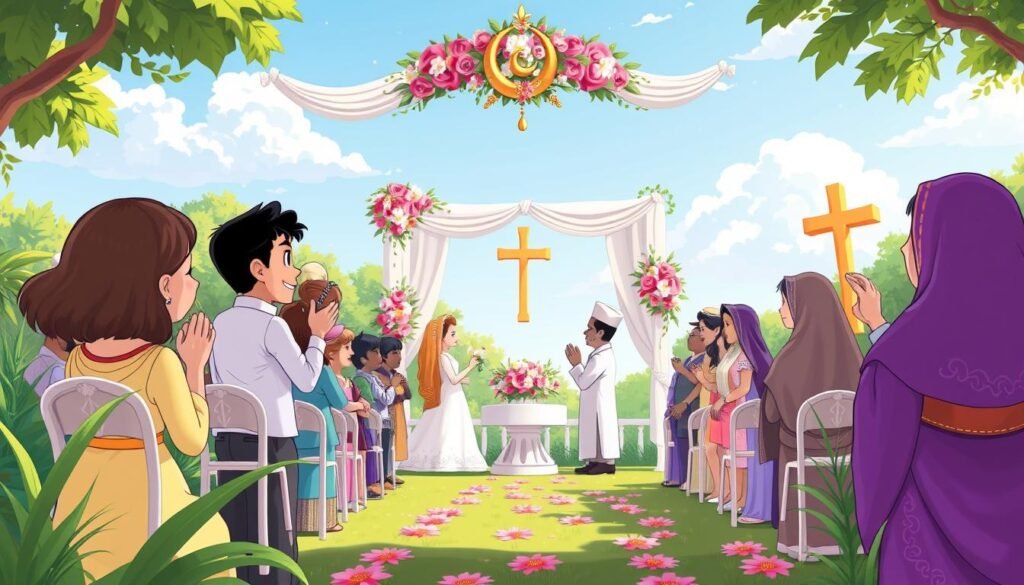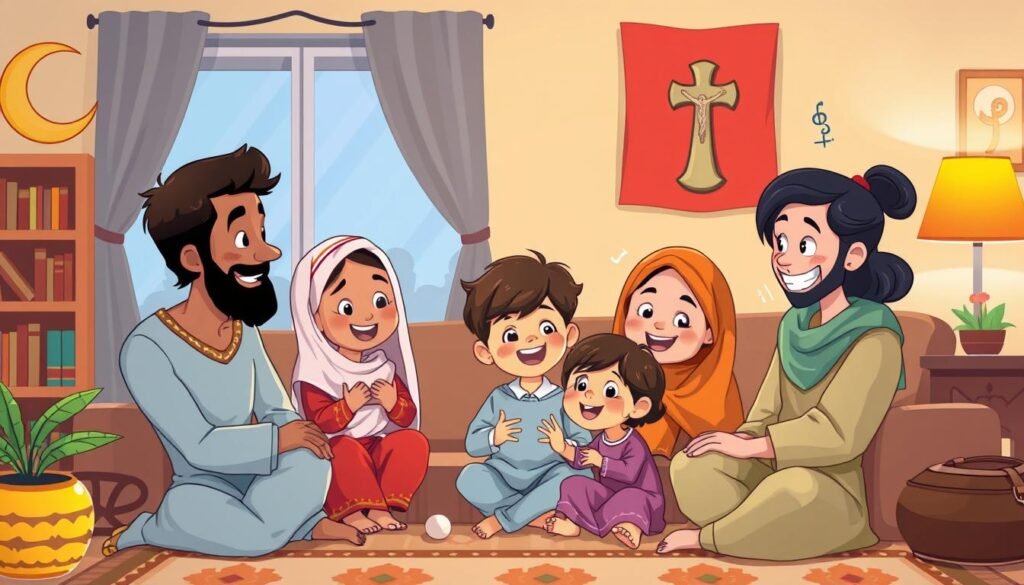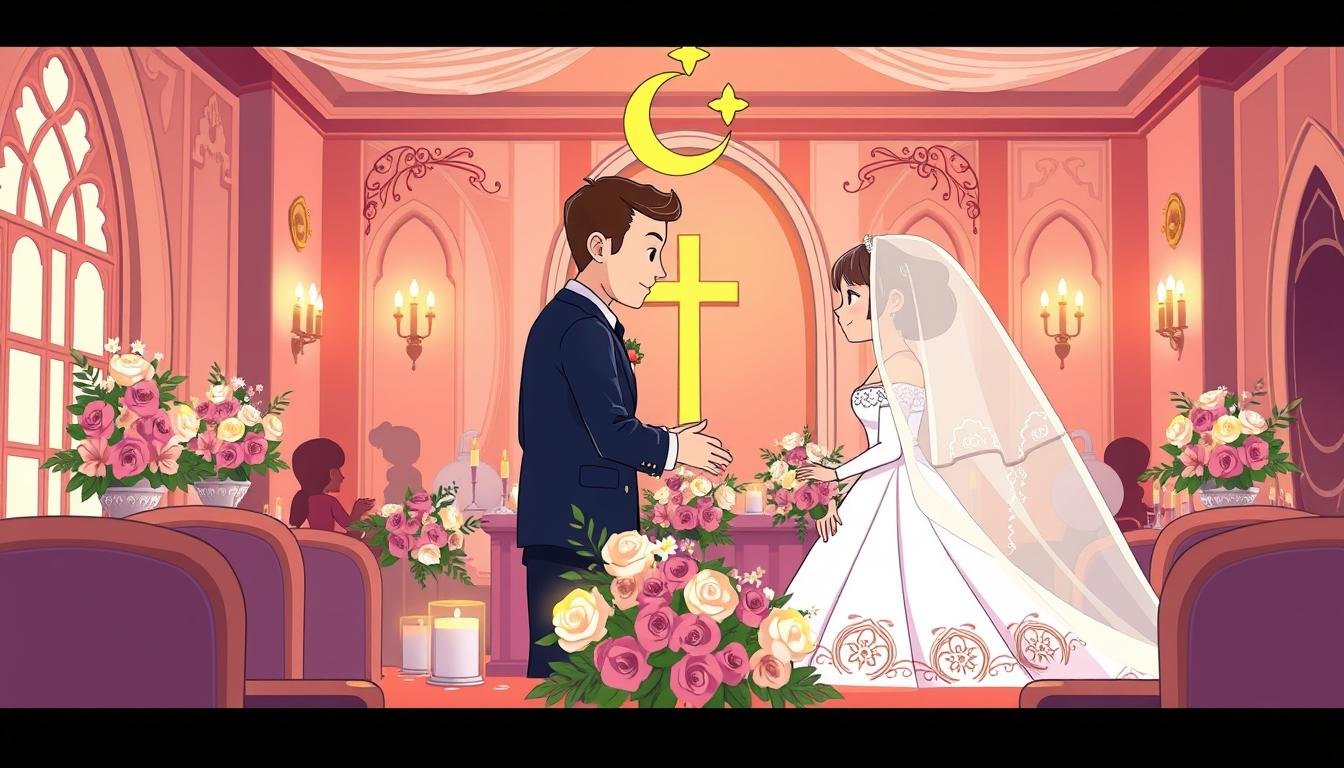Can a Muslim and a Catholic find happiness together? Or will their different faiths cause too many problems? This question leads us to look closely at the challenges of interfaith marriages.
Marriages between Muslims and Catholics face many obstacles. They must deal with their own beliefs, what others expect, and family support. It’s key for them to understand each other’s faiths, not just for themselves but also for their future kids.
Islam and Catholicism have their own rules about marriage. We’ll explore if these unions are allowed, what raising kids together means, and the legal sides of these marriages.
For more on these complex issues, check out this resource. It offers a deep dive into how faith and personal beliefs can work together in an interfaith marriage.
Understanding Interfaith Marriages
Interfaith marriages happen when people from different religions get together. Today, more and more people from different cultures are getting married. They try to respect and honor each other’s faith, which can be both rewarding and challenging.
For a successful interfaith marriage, it’s key to find common ground in beliefs. Some couples decide to follow one religion or none at all. Others might choose to convert, adding a new dimension to their relationship.
But, there are also hurdles. Like deciding how to raise kids or celebrate holidays. It’s important for both partners to understand and respect each other’s faith. Some even teach their kids both religions, promoting understanding and respect.
In the end, interfaith marriages need both partners to be open and respectful. By talking openly and valuing each other’s differences, they can build strong, lasting bonds.
The Basics of Muslim and Catholic Marriages
Learning about Muslim and Catholic marriages shows big differences. In Islam, marriage is a sacred contract called nikah. It’s about mutual consent and raising children in the faith. This bond ties not just two people, but also their families and communities.
Catholic marriage sees marriage as a sacrament. It must follow rules like being faithful and open to having children. If a Catholic marries another baptized Christian, they need permission from their diocese. The church wants children raised as Catholics.
Both traditions have special vows and celebrations. These reflect the culture and help couples start their life together. Each tradition has its own way of making the marriage special.
Can A Muslim Marry A Catholic?
When a Muslim and a Catholic think about getting married, they face many questions. Each faith has its own views on marrying outside of it. This can be a big deal for Muslims who might want to marry someone from another faith.
In the United States, about one in ten Muslims are married to someone who isn’t Muslim. This number goes up to one in six for those under 40. This shows that more Muslims are open to marrying outside their faith.
Religious Perspectives on Interfaith Marriage
In Islam, Muslim men can marry women from the “People of the Book,” like Christians. Islam sees these marriages as valuable but sets rules, like for Muslim women marrying non-Muslim men.
Catholicism needs a special permission for Catholics to marry someone who isn’t Catholic. This permission is to make sure the kids are raised properly in their faith. This can add to the challenges of interfaith marriages.
Challenges of Interfaith Relationships
Being in a Muslim-Catholic marriage can bring up big problems. The two faiths have different beliefs, values, and traditions. This can make it hard to agree on important things.
People who don’t follow their faith as closely might be more open to marrying outside of it. But, having a shared faith, like believing in Jesus, is important for a happy marriage. Family views on interfaith marriages can also affect the couple.

Islamic Views on Marrying Non-Muslims
The Islamic view on marrying outside the faith is complex. It looks at both religious rules and social effects. Muslim men can marry women from Christianity and Judaism under certain conditions.
This is based on a hadith: “A woman is married for four things: for her wealth, for her lineage, for her beauty or for her piety.” It shows that faith is not the only factor in choosing a spouse.
Muslim men can marry non-Muslim women, but it’s different for Muslim women. They are not allowed to marry outside their faith. This can affect children’s religious beliefs, leading to confusion.
Women thinking about marrying a non-Muslim should study Islam for a year first. This helps make informed choices. Scholars like Maulana Ashraf Thanavi say it’s important to check if a partner truly believes in their faith.
Marrying a non-Muslim can have big effects. A woman might get closer to Islam or move away from it because of her partner. This worries people about the impact on future generations.
It’s wise to think about the harm that might come from such marriages. Islamic law says it’s better to avoid harm than seek benefits in these cases.
It’s also important to understand who is considered People of the Book. In the West, many who call themselves Jewish or Christian may not really practice their faith. This makes choosing a partner even more complex.
Catholic Requirements for Marrying Non-Catholics
Catholics marrying non-Catholics have certain rules to follow. They need a special permission from the church. This ensures both understand the basics of Catholic marriage.
Dispensation Requirements for Catholics
When a Catholic wants to marry someone who isn’t Catholic, they need church approval. This is key for a valid marriage, even if there are differences in faith. Both must agree to respect the core of marriage.
The Catholic must also promise to keep their faith and raise any kids as Catholics. The church sees these marriages as chances for growth and learning.
Marriage prep often includes talks with a priest. He helps the couple learn about their faith. Even with differences, the church values these marriages for their spiritual benefits.
Implications for Raising Children in Interfaith Marriages
Raising kids in interfaith families is both rewarding and challenging. In Muslim-Catholic marriages, couples face the tough task of choosing a religious path for their children. Both faiths want to teach their values, leading to disagreements on how to raise their kids.
Religious Upbringing for Muslim-Catholic Families
Muslim parents usually want their kids to follow Islam. This can conflict with a Catholic partner’s wish to raise them as Catholics. Finding a balance is key, blending both faiths in a loving way.
Potential Conflicts in Religious Education
Love is the base of interfaith families, but disagreements can happen. Differences in holidays and church visits show the parents’ different beliefs. Talking openly is vital to agree on raising their kids.
It’s important to let the non-Muslim spouse be involved. This can help the family live together, respecting each faith’s traditions.

Legal Considerations in Interfaith Marriages
Interfaith marriages, like those between Muslims and Christians, have complex legal issues. Laws vary by region, influenced by religion and culture. For example, in some Muslim countries, Muslim men can marry Christian or Jewish women but not Muslim women.
Studies show Muslim men often marry women from the People of the Book. The Quran allows this, setting legal and religious rules. Religious leaders stress the importance of keeping faith strong in these marriages.
Family law also plays a role in these marriages. It deals with the legitimacy of children. Challenges arise, like deciding on a child’s religious upbringing in Christian-Muslim marriages. Despite these, many couples respect each other’s beliefs, leading to a deeper understanding.
Interfaith marriages, like those between Christians and Muslims or Hindus, are becoming more common. Yet, there’s a lack of support for Christian-Muslim couples. This shows the need for better resources to help them with legal and cultural issues.
Insights from the Quran on Marital Relationships
The Quran guides us on how to build strong marriages. It teaches us to be faithful, kind, and respectful to each other. It says Muslims should marry people who believe in the same faith.
Muslim men can marry women from other faiths, like Christians and Jews, if they are chaste. This shows respect for shared values. But, it’s important to be careful.
A happy home often comes when both partners share the same faith. Muslim women are not allowed to marry outside Islam. This is to protect their faith.
Islamic teachings say interfaith marriages are okay, but they must respect Islam. Keeping Islamic values in the family is very important. Marriages between Muslims and people of the book are accepted if both partners stay true to their beliefs.
This view helps Muslim-Catholic couples understand the Quran’s teachings. Building a home based on shared values can make their marriage strong.
Historical Context of Interfaith Marriages
The history of interfaith marriages shows how different religious groups interact. It focuses on Muslims and Christians. We learn from past agreements and frameworks that shape today’s relations.
Significant Agreements like the Ashtiname of Muhammad
The Ashtiname of Muhammad is a key document. It shows Muslims and Christians can live in peace. This agreement was made by the Prophet Muhammad with Christians at Saint Catherine’s Monastery.
It teaches respect and working together. Such agreements help us understand and accept different faiths. They are important for interfaith marriage history.
Knowing about the Ashtiname of Muhammad helps today’s interfaith couples. It teaches them to be open and understanding. This is very important because of the challenges in Islamic-Christian relations today.
Modern Trends in Interfaith Marriages
In recent years, we’ve seen big changes in interfaith marriages, like those between Muslims and Catholics. More people are moving away from old ways, with only about 6 in 10 married Americans sharing the same faith. This change makes us think about how society views different kinds of relationships.
Young adults are now keeping their cultural roots while also welcoming partners from other faiths. But, opinions on Muslim-Catholic marriages are mixed. Some stick to old views, while others push for understanding and talking across faiths.
Studies show that Muslim-Catholic marriages, along with others, are happening more often. People want to find common ground, not just because of their faith. This shows a shift towards openness and moving past old ideas about interfaith marriages.
Support from Communities and Families
Community support is key for interfaith families, like those with Muslim and Catholic backgrounds. Talking openly in families helps ease cultural differences. This way, families can support each other, helping couples manage their unique situations.
Programs and events that bring people together are very important. They help people understand and respect each other’s beliefs. This is vital for keeping families strong. The dialogue between Muslims and Catholics started in 1997, showing the value of respect.
Sharing experiences through community events can bring families closer. It lets them celebrate their traditions together. By facing challenges with kindness, families can grow stronger. This support helps children in interfaith homes, who might struggle with their identity.
FAQ
Can a Muslim marry a Catholic?
What are the challenges of interfaith relationships?
How does Islamic jurisprudence view interfaith marriages?
What are the requirements for Catholics marrying non-Catholics?
How should Muslim-Catholic families approach raising their children?
Are there legal implications for interfaith marriages?
What insights does the Quran provide regarding marital relationships?
What historical agreements influence modern interfaith marriages?
What recent trends are observed in interfaith marriages?
How can community support improve interfaith family dynamics?

Embracing Faith, One Insight at a Time!
The teachings of the Quran have always guided my path. With a deep passion for Islamic knowledge, I strive to blend the wisdom of tradition with the relevance of today, making the timeless messages of Islam accessible and meaningful for everyone.
Muslim Culture Hub is my platform to share historical insights and thought-provoking articles, exploring both well-known and lesser-discussed aspects of Islamic culture and beliefs. My mission is to create an inclusive online space where everyone can learn, strengthen their faith, and connect with the profound message of Islam.
Join the journey!
May peace be upon you.








